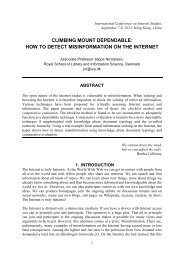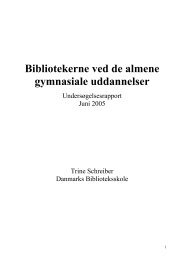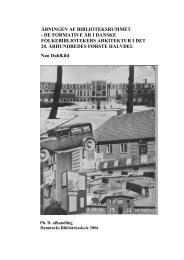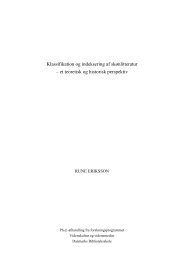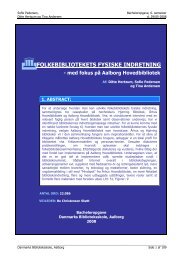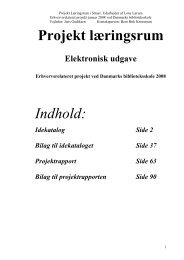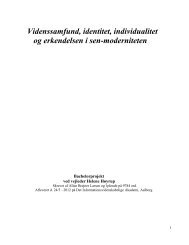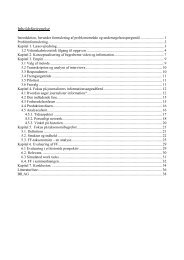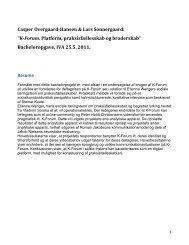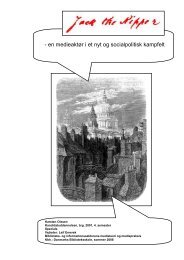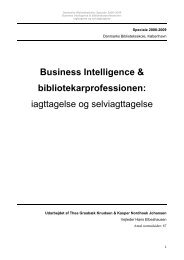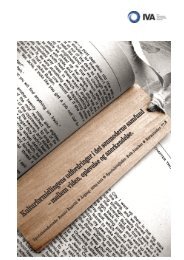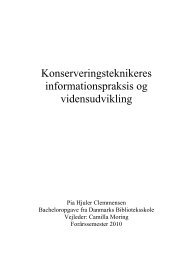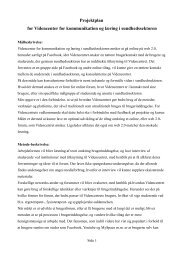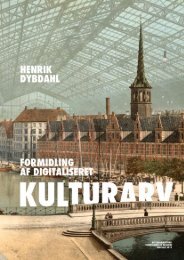Hvorfor er det sjovt at surfe på nettet? - Forskning
Hvorfor er det sjovt at surfe på nettet? - Forskning
Hvorfor er det sjovt at surfe på nettet? - Forskning
Create successful ePaper yourself
Turn your PDF publications into a flip-book with our unique Google optimized e-Paper software.
21<br />
Und<strong>er</strong>holdende int<strong>er</strong>netsøgning<strong>er</strong> – S<strong>er</strong>ena Borsello<br />
inform<strong>at</strong>ion acquisition […] With regard to product qu<strong>er</strong>ies, some of<br />
the search engine us<strong>er</strong>s would have been searching for inform<strong>at</strong>ion<br />
about the product or wanting to buy the product. Howev<strong>er</strong>, it seems<br />
reasonable to suppose th<strong>at</strong> a substantial proportion of those qu<strong>er</strong>ies<br />
rel<strong>at</strong>ing to products can be regarded not as inform<strong>at</strong>ion seeking but<br />
the virtual equivalent of window‐shopping, th<strong>at</strong> is, a leisure activity”<br />
(Wall<strong>er</strong> 2011, s. 772).<br />
Popkultur som k<strong>at</strong>egori <strong>er</strong> ikke synlig i andre studi<strong>er</strong>, fordi den enten <strong>er</strong> delt op<br />
imellem forskellige k<strong>at</strong>egori<strong>er</strong>, ell<strong>er</strong> fordi den får en uigennemskuelig betegnelse (fx ”people<br />
places and things” i Jansen & Spink 2006 s. 257). Segev og Ahituv (2010) kritis<strong>er</strong><strong>er</strong> også<br />
Spink og kollega<strong>er</strong> for <strong>at</strong> ikke <strong>at</strong> forklare r<strong>at</strong>ionale bag d<strong>er</strong>es klassifik<strong>at</strong>ion, og specifikt fordi<br />
k<strong>at</strong>egori<strong>er</strong>ne und<strong>er</strong>holdning og mennesk<strong>er</strong> kan være ov<strong>er</strong>lappende (Segev & Ahituv 2010, s.<br />
19). Popkultur som k<strong>at</strong>egori dækk<strong>er</strong> i Wall<strong>er</strong>s (2011, s. 765) studie ov<strong>er</strong> ”popular music, TV<br />
shows, actor, movie, videogame, celebrity, Myspace, radio, Youtube”. Denne definition lign<strong>er</strong><br />
<strong>på</strong> mange punkt<strong>er</strong> Parks (2009) und<strong>er</strong>holdnings k<strong>at</strong>egori, som også <strong>er</strong> udviklet induktivt ud<br />
fra log fil fra et koreansk søgemaskine. Und<strong>er</strong>holdnings‐k<strong>at</strong>egorien inklud<strong>er</strong><strong>er</strong> hos Park<br />
(2009, s. 130) : ”anim<strong>at</strong>ion, broadcasting, dramas, fortune, ent<strong>er</strong>tain<strong>er</strong>s, gen<strong>er</strong>al, movies,<br />
music”.<br />
Fordelen med brug af log‐fil<strong>er</strong> som d<strong>at</strong>akilde <strong>er</strong>, <strong>at</strong> de repræsent<strong>er</strong>e reelle søgning<strong>er</strong>,<br />
foretaget af reelle brug<strong>er</strong>e i n<strong>at</strong>urlige omgivelse (Jansen 2006; Wall<strong>er</strong> 2011, s. 763). De<br />
nævnte studi<strong>er</strong> dann<strong>er</strong> d<strong>er</strong>for et realistisk billede af, hvad individ<strong>er</strong>ne søg<strong>er</strong> <strong>på</strong> <strong>nettet</strong>.<br />
Problemet i forhold til specialets problemstilling <strong>er</strong>, <strong>at</strong> log‐fil<strong>er</strong> ikke indehold<strong>er</strong><br />
inform<strong>at</strong>ion<strong>er</strong> om individ<strong>er</strong>nes formål med søgning<strong>er</strong> (Segev & Ahituv 2010, s. 22).<br />
Und<strong>er</strong>holdning <strong>er</strong> h<strong>er</strong> defin<strong>er</strong>et a priori ud fra en antagelse om, hvad individ<strong>er</strong>ne opf<strong>at</strong>t<strong>er</strong><br />
som und<strong>er</strong>holdende. Und<strong>er</strong>holdning som k<strong>at</strong>egori indehold<strong>er</strong> ofte multimediale indhold<br />
ell<strong>er</strong> inform<strong>at</strong>ion<strong>er</strong> d<strong>er</strong> rel<strong>at</strong><strong>er</strong><strong>er</strong> sig til und<strong>er</strong>holdningsbranchen. D<strong>er</strong> <strong>er</strong> d<strong>er</strong>imod bevis <strong>på</strong>,<br />
<strong>at</strong> individ<strong>er</strong>ne også led<strong>er</strong> eft<strong>er</strong> und<strong>er</strong>holdning andre sted<strong>er</strong>, fx i politiske blogs (Kim &<br />
Johnson, in press) og online avis<strong>er</strong> (Chung & Yoo 2008; Flavián & Gurrea 2009; Diddi &<br />
LaRose 2006). Dette betyd<strong>er</strong>, <strong>at</strong> hvis man vil und<strong>er</strong>søge <strong>det</strong> und<strong>er</strong>holdende ved<br />
int<strong>er</strong>netsøgning, skal man spørge brug<strong>er</strong>ne selv, hvad de find<strong>er</strong> und<strong>er</strong>holdende.<br />
Dette problem <strong>er</strong> delvis ov<strong>er</strong>vun<strong>det</strong> i de studi<strong>er</strong>, d<strong>er</strong> anvend<strong>er</strong> spørgeskema<strong>er</strong> som<br />
d<strong>at</strong>aindsamlingsmetod<strong>er</strong>, fordi man d<strong>er</strong>ved har mulighed for <strong>at</strong> spørge respondent<strong>er</strong>ne om<br />
formålet med d<strong>er</strong>es søgning<strong>er</strong>. De anvendte spørgsmål til <strong>at</strong> spørge ind til motiv<strong>er</strong> for<br />
int<strong>er</strong>netbrug <strong>er</strong> d<strong>er</strong>udov<strong>er</strong> så gen<strong>er</strong>elle, <strong>at</strong> <strong>det</strong> ikke <strong>er</strong> muligt ud fra disse, <strong>at</strong> antage, hvad



